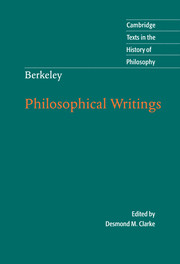Book contents
- Frontmatter
- Contents
- Acknowledgments
- List of abbreviations
- Introduction
- Chronology
- Further reading
- Note on the texts
- An Essay towards a New Theory of Vision
- A Treatise Concerning the Principles of Human Knowledge
- Three Dialogues between Hylas and Philonous
- An Essay on Motion
- Alciphron: or, the Minute Philosopher [excerpts]
- Siris: A Chain of Philosophical Reflexions and Inquiries Concerning the Virtues of Tar-Water [excerpts]
- Glossary
- Index
- Cambridge Texts in the History of Philosophy
- References
An Essay towards a New Theory of Vision
Published online by Cambridge University Press: 05 June 2012
- Frontmatter
- Contents
- Acknowledgments
- List of abbreviations
- Introduction
- Chronology
- Further reading
- Note on the texts
- An Essay towards a New Theory of Vision
- A Treatise Concerning the Principles of Human Knowledge
- Three Dialogues between Hylas and Philonous
- An Essay on Motion
- Alciphron: or, the Minute Philosopher [excerpts]
- Siris: A Chain of Philosophical Reflexions and Inquiries Concerning the Virtues of Tar-Water [excerpts]
- Glossary
- Index
- Cambridge Texts in the History of Philosophy
- References
Summary
3rd edition 1732
The Contents
Section
1 Design
2 Distance of itself invisible
3 Remote distance perceived rather by experience than by sense
4 Near distance thought to be perceived by the angle of the ‘optic axes’
5 Difference between this and the former manner of perceiving distance
6 Also by diverging rays
7 This depends not on experience
8 These the common accounts, but not satisfactory
9 Some ideas perceived by mediation of others
10 No idea which is not itself perceived can be the means of perceiving another
11 Distance perceived by means of some other idea
12 Those lines and angles mentioned in optics are not themselves perceived
13 Hence the mind does not perceive distance by lines and angles
14 Also because they have no real existence
15 And because they are insufficient to explain the phenomena
16 The ideas that suggest distance are 1st the sensation arising from the turn of the eyes
17 Betwixt which and distance there is no necessary connexion
18 Scarce room for mistake in this matter
19 No regard had to the angle of the optic axes
20 Judgment of distance made with both eyes, the result of experience
21 2ndly. Confusedness of appearance
22 This the occasion of those judgments attributed to diverging rays.
23 Objection answered
24 What deceives the writers of optics in this matter
25 The cause, why one idea may suggest another
26 This applied to confusion and distance
27 3rdly. The straining of the eye
28 The occasions which suggest distance have in their own nature no relation to it
29 A difficult case proposed by Dr. Barrow as repugnant to all the known theories
[…]
- Type
- Chapter
- Information
- Berkeley: Philosophical Writings , pp. 1 - 66Publisher: Cambridge University PressPrint publication year: 2009
References
- 4
- Cited by



